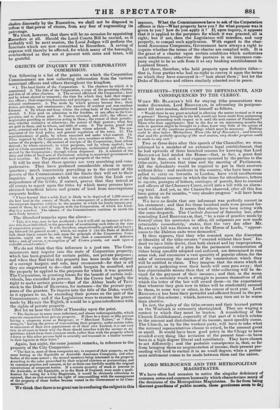TITHE-SUITS—THEIR COST TO DEFENDANTS, AND CONSEQUENCES TO THE CLERGY.
WHEN Mr. BLAMIRE'S bill for staying tithe prosecutions was under discussion, Lord BROUGHAM, in advocating its postpone- ment till next session, delivered himself as follows.
" Would there be any great mischief in allowing the matter to stand as it was at present ? Having brought in the bill, would any harm result from postponing any further proceeding with respect to it until the next session of Parliament? Those who were apprehensive that in the five or six intervening months the suits in question might be brought to a close, knew very little of the nature of our laws, or of the cumbrous proceedings which must be necessary. Nothing could be done before Michaelmas Term (the 2d of November); and between that and the probable opening of the next session, very slender progress could be made in any suit."
Two or three days after this speech of the Chancellor, we were informed by a member of an extensive legal establishment, that he had upwards of three hundred reasons for knowing that Lord
BROUGHAM had misled the House—that, in fact, a great deal would be done, and a vast expense incurred by the parties to the tithe-suits, between that time and the meeting of Parliament. All the defendants would be required to put in their answers
without delay : and residents in the country, who have been com- pelled to carry on lawsuits in London, have vivid recollections of the insidious manner in which the items for attendances, letters to agents, postages of letters, carriages of parcels, fees to counsel and officers of the Chancery Court, swell into a bill with an alarm- ing total. And yet, as the Chancellor observed, after all this has been going on for months, "very slender progress" will have been made in the suit.
We have no doubt that our informant was perfectly correct in his statement ; and that his three hundred suits were pressed for-
ward without delay. It seems that others have been acting with
the same despatch. The Carlisle Journal of Saturday last, after reminding Lord BROUGHAM, that, "by a rule of practice made by himself since his accession to office, all subpcenas are now made returnable immediately," states, that the very day after Mr. BLAMIRE'S bill was thrown out in the House of Lords, "appear- ances to the Dalston suits were demanded."
It thus appears, that they who counted upon the discretion or liberality of the tithe-owners "counted without their host." In- deed we have little doubt, that both clerical and lay impropriators, in the expectation of a plan for the permanent commutation of tithes being speedily adopted and enfoiced, are determined to run some risk, and encounter a vast quantity of popular odium, for the
sake of increasing the amount of the commutation which they will be entitled to claim. They imagine that the storm which at
present is gathering over their heads will soon pass away; that less objectionable means than that of tithe-collecting will be de- vised for the payment of their incomes ; and that, in the mean while, it is certainly worth a struggle to possess themselves of all which the letter of the law will award them—in the expectation that whatever they gain now in tithes will be comfortably secured
to them, in some way or other, in the course of next year. Lord BROUGHAM has been their powerful and efficient friend in the pro- motion of this scheme ; which, however, may turn out to be worse than abortive.
In fact, the policy of the tithe-owners and their learned patron on the Woolsack is extremely shortsighted. They are waging a contest in which they must be beaten. A remodelling of the Church Establishment, especially of that part of it which relates to the amount and distribution of its income, must speedily ensue. The Church, as by far the weakest party, will have to take what the national representatives choose to award, be the amount great or small. It would have been good pohcy in the Clergy to have avoided every thing like irritation at the present time—to have been in a high degree liberal and conciliatory. They have chosen to act differently; and the probable consequence is, that, so far from bringing them an augmentation of income, their present pro- ceeding will tend to curtail it in no small degree, when a perma- nent settlement comes to be made between them and the nation.






















 Previous page
Previous page